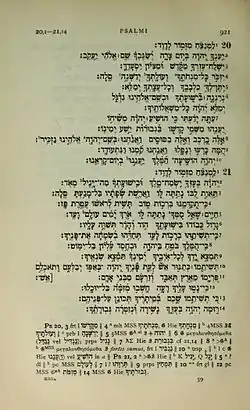Psalm 20
Psalm 20 is the 20th psalm of the Book of Psalms. It is internally attributed to King David. There are 9 verses. In the International Critical Commentary series, Charles and Emilie Briggs suggest that it was written during the reign of Jehoshaphat.[1]
| Psalm 20 | |
|---|---|
← Psalm 19 Psalm 21 → | |
 Psalms 20-21 in Biblia Hebraica Kittel (1909) | |
| Book | Book of Psalms |
| Hebrew Bible part | Ketuvim |
| Order in the Hebrew part | 1 |
| Category | Sifrei Emet |
| Christian Bible part | Old Testament |
| Order in the Christian part | 19 |
In Jewish prayer
The 70 words in this psalm may reference the 70 years of exile between the first and second temples, or as suggested in the Zohar, the 70 cries of pain associated with child birth.[2] It has been inserted into daily prayer following the loss of the second temple to symbolize the somber period prior to the construction of the third temple.[3]
It is used in Jewish prayer in several ways:
- The psalm is recited in its entirety as a part of daily prayer (except on Shabbat, Yom Tov, Rosh Chodesh, Chol Hamoed, Tisha B'Av, Hanukkah, Purim, Shushan Purim, the 14th and 15th of Adar I, and the days before Yom Kippur and Passover). In this context it is known as Lamenatzeiach (the first word of the psalm in Hebrew), and is recited between Ashrei and Uva Letziyon toward the end of Shacharit.
- Verses 2 and 10 are part of the opening paragraph of the long Tachanun recited on Mondays and Thursdays.[4]
- Verse 10 is the 11th verse of V'hu Rachum in Pesukei Dezimra,[5] is the final verse of Yehi Kivod in Pesukei Dezimra,[6] is found in Uva Letzion,[7] is the second of two verses recited as an introduction at Maariv,[8] and is part of Havdalah.[9]
- It is also considered appropriate to recite in times of stress, such as labor.[2]
References
- Charles Augustus Briggs; Emilie Grace Briggs (1960) [1906]. A Critical and Exegetical Commentary on the Book of Psalms. International Critical Commentary. 1. Edinburgh: T & T Clark. p. 176.
- Barenblat, Rachel. "Psalm 20: a psalm for childbirth". VelveteenRabbi. Retrieved 25 June 2015.
- The Complete Artscroll Siddur page 152
- The Complete Artscroll Siddur page 125
- The Complete Artscroll Siddur page 62
- The Complete Artscroll Siddur page 66
- The Complete Artscroll Siddur page 157
- The Complete Artscroll Siddur page 257
- The Complete Artscroll Siddur page 619
Musical settings
Psalm set in 1688 by Michel-Richard de Lalande, as a grand motet (S.36, music lost). André Campra set one grand motet. Marc-Antoine Charpentier set around 1670 one "Exaudiat te Dominus", H.162 for soloists, double chorus, double orchestra (flutes and strings), and continuo, around 1675 one "Prière pour le Roi" H.165 for 3 voices, 2 treble instruments, and continuo. At the beginning of 1680s, he set another one, "Exaudiat pour le Roi à 4", H.180, ( H.180 a, H.180 b, 1690) for soloists, chorus, and continuo. Henry Desmarest set one grand motet "Exaudiat te Dominus".
External links
| Wikimedia Commons has media related to Psalm 20. |
- Psalm 20 at Wikisource
- Psalm 20 in Hebrew and English - Mechon-mamre